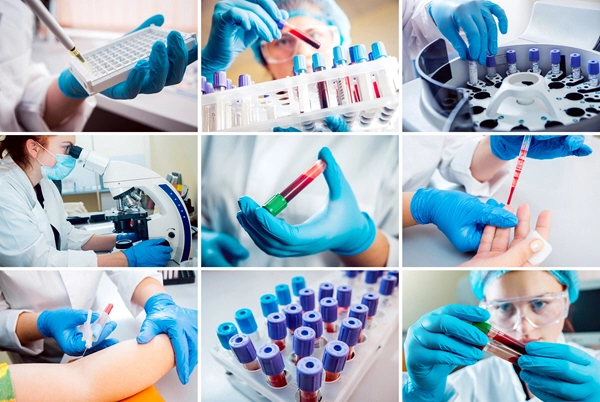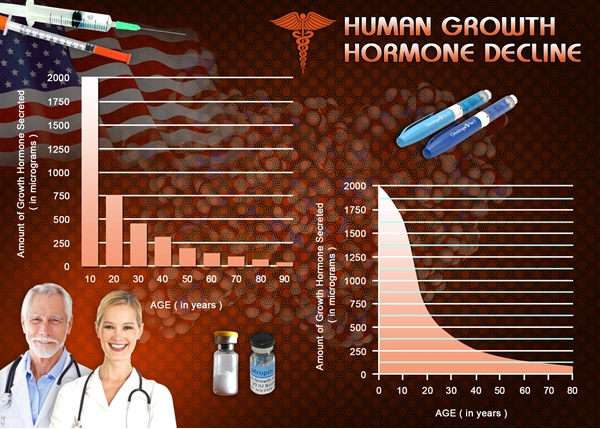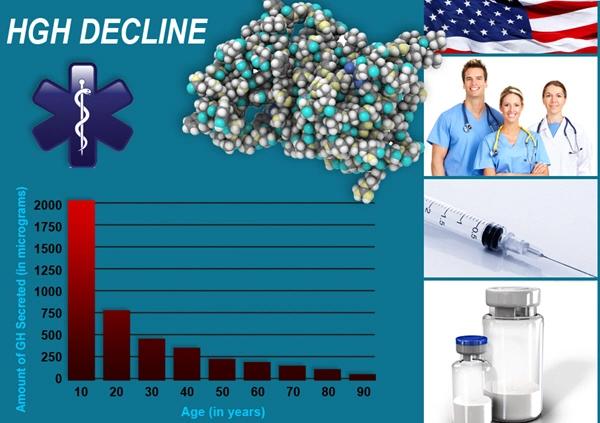Introduction
Andropause, often referred to as male menopause, is a condition characterized by a gradual decline in testosterone levels in aging men. This phenomenon has been increasingly recognized as a significant factor influencing various aspects of men's health, including weight management. A comprehensive 20-year study conducted in the United States has shed light on the intricate relationship between andropause and obesity rates among American males. This article delves into the findings of this study, exploring the impact of hormonal changes on body weight and offering insights into effective weight management strategies for men navigating andropause.
Understanding Andropause and Its Effects on Body Composition
As men age, their testosterone levels naturally decline, typically beginning around the age of 40. This gradual decrease in testosterone can lead to a range of symptoms, including reduced muscle mass, increased body fat, and a slower metabolism. The 20-year study revealed that men experiencing andropause had a significantly higher risk of developing obesity compared to their counterparts with stable testosterone levels. The research indicated that the decline in testosterone was associated with an average weight gain of 10-15 pounds over the study period, primarily in the form of visceral fat, which is known to increase the risk of various health issues, such as heart disease and diabetes.
The Link Between Hormonal Changes and Obesity
The study found that the hormonal shifts associated with andropause played a crucial role in the development of obesity among American males. As testosterone levels decreased, the body's ability to maintain lean muscle mass diminished, leading to a reduction in overall metabolic rate. This, in turn, contributed to an increased accumulation of body fat, particularly around the abdominal area. The research also highlighted the role of insulin resistance, which often accompanies declining testosterone levels, in promoting weight gain and increasing the risk of obesity.
Strategies for Weight Management During Andropause
Given the significant impact of andropause on weight management, it is essential for American males to adopt proactive strategies to maintain a healthy body weight during this transitional period. The study emphasized the importance of a multi-faceted approach, combining lifestyle modifications, dietary adjustments, and, in some cases, medical interventions.
Exercise and Physical Activity
Regular exercise, particularly strength training and high-intensity interval training (HIIT), was found to be highly effective in counteracting the muscle loss and metabolic slowdown associated with andropause. The study recommended that men engage in at least 150 minutes of moderate-intensity aerobic activity or 75 minutes of vigorous-intensity activity per week, along with two or more days of strength training exercises targeting major muscle groups.
Dietary Modifications
The research highlighted the significance of a balanced diet in managing weight during andropause. Men were encouraged to focus on consuming nutrient-dense foods, such as lean proteins, whole grains, fruits, and vegetables, while limiting their intake of processed foods, added sugars, and saturated fats. The study also emphasized the importance of portion control and mindful eating to prevent overeating and promote weight loss.
Medical Interventions
In cases where lifestyle modifications alone were insufficient, the study suggested that testosterone replacement therapy (TRT) could be considered under the guidance of a healthcare professional. TRT has been shown to help restore testosterone levels, improve muscle mass, and support weight management in men with clinically low testosterone levels. However, the study stressed the importance of regular monitoring and individualized treatment plans to ensure the safe and effective use of TRT.
Conclusion
The 20-year study on andropause and weight management in American males has provided valuable insights into the complex relationship between hormonal changes and obesity. By understanding the impact of declining testosterone levels on body composition and metabolism, men can take proactive steps to maintain a healthy weight during this transitional period. Through a combination of regular exercise, dietary modifications, and, if necessary, medical interventions, American males can navigate andropause while minimizing the risk of obesity and its associated health complications. As research in this field continues to evolve, it is crucial for healthcare providers to stay informed and support men in their journey towards optimal health and well-being during andropause.

- Understanding Andropause: Symptoms, Impact, and Management Strategies for American Men [Last Updated On: February 18th, 2025] [Originally Added On: February 18th, 2025]
- Andropause: Debunking Myths and Understanding Realities for American Men's Health [Last Updated On: March 16th, 2025] [Originally Added On: March 16th, 2025]
- Andropause and Prostate Health: Understanding the Link and Managing Risks in American Males [Last Updated On: March 17th, 2025] [Originally Added On: March 17th, 2025]
- Supplements for Andropause: Enhancing American Men's Health and Vitality [Last Updated On: March 18th, 2025] [Originally Added On: March 18th, 2025]
- Navigating Andropause: Emotional Symptoms and Support Strategies for American Men [Last Updated On: March 19th, 2025] [Originally Added On: March 19th, 2025]
- Managing Andropause: Diet, Exercise, Stress, Sleep, and Regular Check-ups for American Men [Last Updated On: March 19th, 2025] [Originally Added On: March 19th, 2025]
- Andropause and Cognitive Health: Strategies for American Men to Maintain Mental Sharpness [Last Updated On: March 19th, 2025] [Originally Added On: March 19th, 2025]
- Andropause: Understanding Male Menopause and Embracing Life Changes [Last Updated On: March 21st, 2025] [Originally Added On: March 21st, 2025]
- Andropause in American Males: Understanding and Managing Diabetes Risk [Last Updated On: March 21st, 2025] [Originally Added On: March 21st, 2025]
- Managing Andropause: Symptoms, Medical Advice, and Treatment Options for Aging Men [Last Updated On: March 21st, 2025] [Originally Added On: March 21st, 2025]
- Andropause: Mental Health Strategies for Aging American Men [Last Updated On: March 21st, 2025] [Originally Added On: March 21st, 2025]
- Andropause: Importance of Regular Check-ups for Men's Health and Well-being [Last Updated On: March 21st, 2025] [Originally Added On: March 21st, 2025]
- Navigating Andropause: Emotional Strategies for American Men's Well-being [Last Updated On: March 22nd, 2025] [Originally Added On: March 22nd, 2025]
- Andropause and Memory: Strategies for American Males to Enhance Cognitive Function [Last Updated On: March 22nd, 2025] [Originally Added On: March 22nd, 2025]
- Andropause and Depression: Recognizing Signs and Seeking Help for American Men [Last Updated On: March 23rd, 2025] [Originally Added On: March 23rd, 2025]
- Hydration's Crucial Role in Managing Andropause Symptoms in American Men [Last Updated On: March 23rd, 2025] [Originally Added On: March 23rd, 2025]
- Andropause: Managing Symptoms to Balance Work and Health in American Men [Last Updated On: March 23rd, 2025] [Originally Added On: March 23rd, 2025]
- Managing Andropause: Essential Foods for American Males' Health and Vitality [Last Updated On: March 23rd, 2025] [Originally Added On: March 23rd, 2025]
- Andropause and Vision: Understanding Changes and Managing Eye Health in American Males [Last Updated On: March 23rd, 2025] [Originally Added On: March 23rd, 2025]
- Andropause in American Men: Combating Fatigue with Exercise, Diet, and Medical Strategies [Last Updated On: March 23rd, 2025] [Originally Added On: March 23rd, 2025]
- Andropause: Family Support Crucial for Men's Health and Well-being [Last Updated On: March 23rd, 2025] [Originally Added On: March 23rd, 2025]
- Andropause and Hormone Replacement Therapy: Benefits and Risks for American Men [Last Updated On: March 23rd, 2025] [Originally Added On: March 23rd, 2025]
- Andropause: Navigating Male Menopause with Support and Understanding [Last Updated On: March 24th, 2025] [Originally Added On: March 24th, 2025]
- Andropause: Navigating Social Impacts and Maintaining Connections in American Men [Last Updated On: March 24th, 2025] [Originally Added On: March 24th, 2025]
- Andropause and Blood Pressure: Monitoring and Management Tips for American Males [Last Updated On: March 24th, 2025] [Originally Added On: March 24th, 2025]
- Andropause and Skin Health: Skincare Strategies for American Males [Last Updated On: March 25th, 2025] [Originally Added On: March 25th, 2025]
- Andropause: Managing Mental Health with Strategic Mental Health Days [Last Updated On: March 25th, 2025] [Originally Added On: March 25th, 2025]
- Andropause and Hair Loss: Causes, Diagnosis, and Treatment Options for American Males [Last Updated On: March 25th, 2025] [Originally Added On: March 25th, 2025]
- Andropause: Declining Testosterone and Its Impact on Kidney Health in American Men [Last Updated On: March 25th, 2025] [Originally Added On: March 25th, 2025]
- Andropause and Digestive Health: Symptoms, Management, and Medical Advice for American Males [Last Updated On: March 25th, 2025] [Originally Added On: March 25th, 2025]
- Managing Andropause: Exercise, Nutrition, and HRT for American Males' Muscle Health [Last Updated On: March 25th, 2025] [Originally Added On: March 25th, 2025]
- Andropause and Liver Health: Strategies for American Males [Last Updated On: March 26th, 2025] [Originally Added On: March 26th, 2025]
- Managing Andropause: Effective Stress Reduction Strategies for American Men [Last Updated On: March 26th, 2025] [Originally Added On: March 26th, 2025]
- Andropause: Understanding Male Menopause and Managing Its Effects [Last Updated On: March 26th, 2025] [Originally Added On: March 26th, 2025]
- Managing Andropause: Benefits of Exercise and Diet for Aging American Men [Last Updated On: March 26th, 2025] [Originally Added On: March 26th, 2025]
- Andropause and Thyroid Function: Interconnected Health Issues in Aging American Men [Last Updated On: March 26th, 2025] [Originally Added On: March 26th, 2025]
- Andropause and Cholesterol: Managing Lipid Levels in Aging American Males [Last Updated On: March 26th, 2025] [Originally Added On: March 26th, 2025]
- Andropause and Joint Health: Strategies for American Men [Last Updated On: March 26th, 2025] [Originally Added On: March 26th, 2025]
- Andropause in American Males: Impacts and Management of Respiratory Health [Last Updated On: March 27th, 2025] [Originally Added On: March 27th, 2025]
- Andropause and Sleep: Managing Symptoms in American Men Through Holistic Approaches [Last Updated On: March 27th, 2025] [Originally Added On: March 27th, 2025]
- Andropause and Emotional Intelligence: Navigating Male Menopause in American Men [Last Updated On: March 27th, 2025] [Originally Added On: March 27th, 2025]
- Andropause: Impact on American Men's Self-Esteem and Treatment Options [Last Updated On: March 27th, 2025] [Originally Added On: March 27th, 2025]
- Andropause: Understanding Male Menopause and Its Impact on Energy and Vitality [Last Updated On: March 28th, 2025] [Originally Added On: March 28th, 2025]
- Andropause in American Men: Symptoms, Diagnosis, and Holistic Management Strategies [Last Updated On: March 28th, 2025] [Originally Added On: March 28th, 2025]
- Andropause: Understanding Symptoms, Importance of Screenings, and Proactive Health Management for Men [Last Updated On: March 29th, 2025] [Originally Added On: March 29th, 2025]
- Mindfulness: A Holistic Approach to Managing Andropause in American Men [Last Updated On: March 29th, 2025] [Originally Added On: March 29th, 2025]
- Andropause: Understanding Male Menopause and Its Impact on Motivation and Well-being [Last Updated On: March 29th, 2025] [Originally Added On: March 29th, 2025]
- Andropause and Immune Health: Strategies for American Males [Last Updated On: March 29th, 2025] [Originally Added On: March 29th, 2025]
- Andropause: Understanding Symptoms, Treatments, and Maintaining Confidence in American Men [Last Updated On: March 29th, 2025] [Originally Added On: March 29th, 2025]
- Andropause and Hearing Loss: Understanding the Link and Managing Symptoms [Last Updated On: March 30th, 2025] [Originally Added On: March 30th, 2025]
- Andropause and Dental Health: Essential Tips for American Males [Last Updated On: March 30th, 2025] [Originally Added On: March 30th, 2025]
- Andropause: Enhancing Men's Quality of Life Through Community Support and Awareness [Last Updated On: March 30th, 2025] [Originally Added On: March 30th, 2025]
- Hobbies: A Vital Tool for Managing Andropause in American Men [Last Updated On: March 31st, 2025] [Originally Added On: March 31st, 2025]
- Managing Andropause and Allergies: A Comprehensive Guide for American Males [Last Updated On: April 1st, 2025] [Originally Added On: April 1st, 2025]
- Andropause: Impact on Creativity and Cognitive Function in Aging American Men [Last Updated On: April 2nd, 2025] [Originally Added On: April 2nd, 2025]
- Navigating Andropause: Goal Setting for Health and Resilience in American Men [Last Updated On: April 5th, 2025] [Originally Added On: April 5th, 2025]
- Andropause and Skin Sensitivity: Management Tips for American Men [Last Updated On: April 6th, 2025] [Originally Added On: April 6th, 2025]
- Andropause: Understanding Male Menopause and Its Impact on Purpose and Well-being [Last Updated On: April 7th, 2025] [Originally Added On: April 7th, 2025]
- Technology's Role in Managing Andropause: Wearables, Telemedicine, and AI Solutions [Last Updated On: April 7th, 2025] [Originally Added On: April 7th, 2025]
- Andropause Impact on Foot Health: Symptoms, Risks, and Management Strategies for Men [Last Updated On: April 8th, 2025] [Originally Added On: April 8th, 2025]
- Andropause and Time Management: Strategies for American Men to Thrive [Last Updated On: April 8th, 2025] [Originally Added On: April 8th, 2025]
- Andropause Effects on Nail Health: Strategies for American Males [Last Updated On: April 9th, 2025] [Originally Added On: April 9th, 2025]
- Andropause Effects on Hand Health: Strategies for American Males [Last Updated On: April 10th, 2025] [Originally Added On: April 10th, 2025]
- Volunteering: A Holistic Approach to Managing Andropause in American Men [Last Updated On: April 10th, 2025] [Originally Added On: April 10th, 2025]
- Andropause Impact on Eye Health: Dry Eye, Cataracts, AMD in American Males [Last Updated On: April 10th, 2025] [Originally Added On: April 10th, 2025]
- Andropause: Impact on American Men's Adventure and Lifestyle Management Strategies [Last Updated On: April 11th, 2025] [Originally Added On: April 11th, 2025]
- Travel as Therapy: Managing Andropause Symptoms in American Men [Last Updated On: April 12th, 2025] [Originally Added On: April 12th, 2025]
- Andropause and Lifelong Learning: Enhancing Men's Health and Well-being [Last Updated On: April 12th, 2025] [Originally Added On: April 12th, 2025]
- Andropause and Ear Health: Strategies for American Males to Maintain Auditory Function [Last Updated On: April 15th, 2025] [Originally Added On: April 15th, 2025]
- Andropause Management: Harnessing Music Therapy for American Men's Holistic Health [Last Updated On: April 16th, 2025] [Originally Added On: April 16th, 2025]
- Andropause and Nasal Health: Symptoms, Management, and Impact on American Males [Last Updated On: April 16th, 2025] [Originally Added On: April 16th, 2025]
- Andropause Impact on American Men's Humor: Coping Strategies and Support [Last Updated On: April 17th, 2025] [Originally Added On: April 17th, 2025]
- Andropause: Understanding Male Menopause and Its Impact on American Men's Identity [Last Updated On: April 17th, 2025] [Originally Added On: April 17th, 2025]
- Art Therapy: A Holistic Approach to Managing Andropause in American Men [Last Updated On: April 18th, 2025] [Originally Added On: April 18th, 2025]
- Andropause: Navigating Male Menopause Through Social Connections and Open Dialogue [Last Updated On: April 18th, 2025] [Originally Added On: April 18th, 2025]
- Andropause and Throat Health: Symptoms, Management Tips, and Lifestyle Adjustments for American Men [Last Updated On: April 19th, 2025] [Originally Added On: April 19th, 2025]
- Andropause: Financial Planning and Lifestyle Adjustments for American Men's Health [Last Updated On: April 19th, 2025] [Originally Added On: April 19th, 2025]
- Andropause Effects on Tongue Health: Symptoms, Management, and Hormonal Therapy Insights [Last Updated On: April 19th, 2025] [Originally Added On: April 19th, 2025]
- Andropause Impact: Rising Depression and Anxiety Rates in American Males Over 20 Years [Last Updated On: April 22nd, 2025] [Originally Added On: April 22nd, 2025]
- Andropause: Understanding Male Menopause and Its Mental Health Impacts in American Men [Last Updated On: April 22nd, 2025] [Originally Added On: April 22nd, 2025]



List of USA state clinics - click a flag below for blood testing clinics.
Word Count: 671



















































